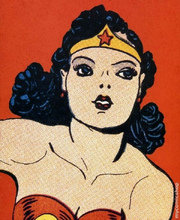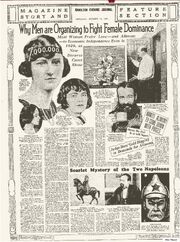Overview
Mainstream comics fandom skews male, although it's difficult to establish accurate current rates of gender participation. Comics writers and editors have historically been male, even at the height of the Golden Age of comics, when women were the target demographic of the hugely successful 'Romance Comics'. Women entering comics fandom will find that the comic fan is assumed to be male. Comics themselves may be overtly or covertly sexist, with highly sexualized drawings and lesser story parts for female characters.
A female fan is often assumed to be less serious, and less legitimate. One mode of interacting with the text, centred around collecting and mastery of the minutiae of comics' long history is often seen as the "male", "right" way of being a fan. The "wrong" way of being a fan, therefore, is to be female, to interact with the text by writing fiction in a community, and specifically to read, perhaps resistantly, a sexual component to the (male) characters.
Currently, comics fandom seems to exist in two parallel groups, one predominantly (although hardly exclusively) female, located primarily on Livejournal, and one predominantly (although hardly exclusively) male, located on messageboards, and to a lesser extent, blogs.
DC Comics


The creator of Wonder Woman and her "lasso of truth", who went by the name Charles Moulton, was actually William Moulton Martson, a university psychologist (who invented the precursor to the lie detector machine), who had previously written about women's issues and feminism in the 1920s prior to thinking up the Amazon in 1941. In addition to his contributions to feminist role models he also reported on backlashes to alimony reliance.
Issues
- A distinct lack of diversity in mainstream comic book characters, with women and minorities reduced to satellites of white men in the vast majority of comics.
- The frequent use of the rape and murder of female secondary characters as a plot device to motivate male characters.
- Unrealistic depictions of female characters, with impact on female readers' body image.
- Invisibility and marginalization of female comics fans (LA Times: Girl's Guide to Comic Con is a great example of this).
- Sexualized environment at comic conventions, etc.
- Harassment at cons, in comic stores, etc.
- Sexist advertising of comics and in comics-related publications/websites
- Pigeonholing of women in comics fandom as being only interested in certain sub-genres. (example)
Incidents
Resources
- The creation of Girl-Wonder.org
- Scans-Daily, a female created space
- Mary-Jane Comiquette
- Women in Refrigerators
- Whitewashing black female characters
Further reading
- I'm demanding better representation for black girls in geek culture by Chaka Cumberbatch on XOJane

